If you’re looking for a new branch in your family genealogy, you might be in luck.
Historians at the University of Nebraska-Lincoln and the University of Maryland have published hundreds of petitions for freedom and other court cases filed by African-Americans in the early 19th century.
The site is called O Say Can You See.
Check it out
Back then, reports Slate, the Chief Justice for the U.S. Court of Appeals for the District of Columbia Circuit refused to include the petitions of black Americans in his case summaries.
So the historians went to another source: an index of court cases compiled from original court documents. The website also includes case files from Maryland state courts and the U.S. Supreme Court.
To parse out the source material, the historians behind O Say Can You See transcribed each document and loaded it with metadata. Each entry is tagged according to the person, place and family involved — and even relationships between individuals are neatly indexed.
The experts note, with an obsessiveness common to coders and historians:
Each entry points to the source document for each attribute. Each attribute can change over time. Name, age, and especially color appeared differently in different documents over time. Residences of the enslaved are named and can be tracked. Our encoding of the relationships in these legal cases begins to suggest the extraordinary range of contacts and connections in the social world of the early republic.
Oh, and if you want to fiddle with the raw data yourself, get at it.







